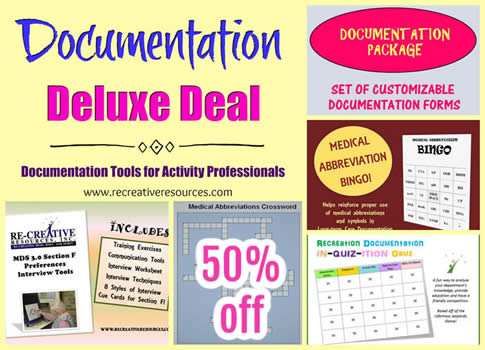The role of activities in the IDC process is crucial. Activity professionals bring a wealth of knowledge into the care plan process, defining the resident’s specific individual traits, preferences, lifestyle, religious/spiritual expressions, behavior, likes and dislikes, leisure lifestyles, relationships, social skills, cognitive skills, memory recall, responses to sensory stimulation, and more. Without the activities component of the care plan, there would be a medical care plan rather than a quality of life approach.
As an Activity Director, I have spent countless hours in care plan meetings. Too many to count! At times, the meetings seemed to be endless. Unfortunately, there are many times in which there is no activity representation, leaving the IDC summary and the care plan, absent of vital, personal, individualized, information and strategies.
As a consultant, I train activity professionals to be confident, outspoken, and outcome based during the care plan process. I have witnessed care plan meetings where the MDS coordinator skips the activities component or simply states the types of activities the resident participates in, rather than the specific responses residents have to activity interventions and programs. Other times, the IDC team looks to the activity professional for recommendations, answers to important issues such as pain, behavior, psychosocial issues, falls, restraints, nutrition, resident rights, communication, and so on.
Often times, in care plan meetings, I have experienced disagreements with the IDC team in terms of resident abilities and responses. I explain to the team that residents may respond differently when in a social setting, than they do during medical care. For example: residents may respond to a variety of sensory stimulation techniques such as opening their eyes, vocalizing, smiling, etc. but do not respond when provided with ADL care. Residents may also find it easer to express themselves verbally or non-verbally when in a group setting or a one to one intervention with an activity staff or volunteer. I encourage activity professionals to voice these observations and not back down because of the differences in observations.
I was once dismissed for reporting that a resident in a semi-comatose state seemed to be responding to the music therapy sessions as evidenced by smiling. I was told that it was impossible for the resident to voluntarily respond to external stimuli, therefore, the observations reported by the Music Therapist, were overlooked. Several months later, after bi-weekly music therapy sessions, the resident responded to the Music Therapist with a “thumbs up” movement. This was reported to the IDC team and this time, taken seriously. The resident began receiving Physical, Occupational, and Speech Therapy, and after about nine months of therapy, the resident was off of the feeding tube, able to move his upper extremities, speak, socialize, sing, etc. He was soon discharged home. I tell activity professionals this story to encourage them to speak out and share their observations with the IDC team, regardless of the differences of opinion.
It is also important for activity professionals to be an active member of the IDC team to learn as much as possible about clinical conditions, medications, other disciplines, etc. I was always one to ask a lot of questions. The care plan meeting is the best place to learn this type of information. Knowledge is power and helps build confidence. This learned information is then used to formulate professional assessments, CAAs, care plans, programming, and so on.
Activity professionals often feel there is a lack of understanding about the role of activities and they are right. Participation in the IDC process is one of the methods we educate others about what we do, why we do it and the benefits to the residents. For more information, click here.

For a documentation package please click here.
|







